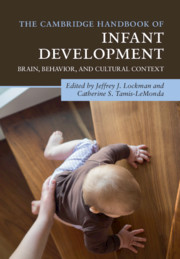Book contents
- The Cambridge Handbook of Infant Development
- The Cambridge Handbook of Infant Development
- Copyright page
- Dedication
- Contents
- Illustrations
- Contributors
- Preface
- Part I Foundations
- Part II Perceptual Development
- 6 Visual Development
- 7 Infant Visual Attention
- 8 Infants’ Perception of Auditory Patterns
- 9 The Development of Touch Perception and Body Representation
- 10 The Development of Infant Feeding
- 11 The Development of Multisensory Attention Skills
- Part III Cognitive Development
- Part IV Action
- Part V Language
- Part VI Emotional and Social Development
- Index
- References
9 - The Development of Touch Perception and Body Representation
from Part II - Perceptual Development
Published online by Cambridge University Press: 26 September 2020
- The Cambridge Handbook of Infant Development
- The Cambridge Handbook of Infant Development
- Copyright page
- Dedication
- Contents
- Illustrations
- Contributors
- Preface
- Part I Foundations
- Part II Perceptual Development
- 6 Visual Development
- 7 Infant Visual Attention
- 8 Infants’ Perception of Auditory Patterns
- 9 The Development of Touch Perception and Body Representation
- 10 The Development of Infant Feeding
- 11 The Development of Multisensory Attention Skills
- Part III Cognitive Development
- Part IV Action
- Part V Language
- Part VI Emotional and Social Development
- Index
- References
Summary
Touch occupies a greater extent of our bodies than all other senses put together (see Gallace & Spence, 2014, for a rich characterization of touch). The skin, our organ of cutaneous touch, is thought to account for 16–18% of body mass (Montagu, 1978). As such, touch can certainly be considered the bodily sense, being distributed not just in our haptic organs (typically our hands; see Radman, 2013), but throughout and covering our bodies. Partly as a result of this, touch is pervasive in sensory experience. It is also our first sense: At 7 weeks of gestation, a human fetus will move if its lips are touched (Hooker, 1952).
Keywords
Information
- Type
- Chapter
- Information
- The Cambridge Handbook of Infant DevelopmentBrain, Behavior, and Cultural Context, pp. 238 - 262Publisher: Cambridge University PressPrint publication year: 2020
